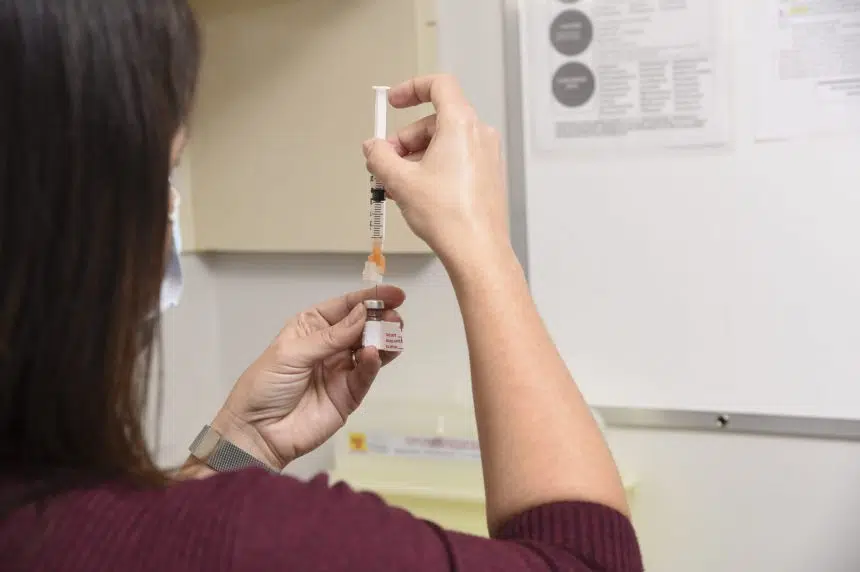Saskatchewan added another tool to its battle against the COVID-19 pandemic on Wednesday afternoon, with the first shipment of the Moderna vaccine arriving in the province.
About 4,900 doses arrived and are headed to the far northwest and far north-central areas of the province, where they’ll be given to at-risk health-care workers and people and residents in long-term and personal care homes.
“Obviously the far north covers a vast geographic area and so the logistics and details of distributing the vaccine, setting up clinic dates, and informing people who are eligible for vaccination at this time is ongoing,” explained the province’s chief medical health officer, Dr. Saqib Shahab.
Northern parts of the province are included in the first phase of the vaccine plan and Shahab said vaccines are going to those two areas in particular because of a “high attack rate” — high numbers of cases and high positivity rates.
Half of the doses are to be held back as public health officials determine the vaccine’s efficacy and the logistical requirements to deliver it. If its success rate is high, doses may be distributed to additional people instead of being held for 28 days as second doses.
The Moderna vaccine is expected to be delivered to communities during the weeks of Jan. 4 and 11.
Saskatchewan is set to get more than 20,000 doses of the Pfizer vaccine through January. Those doses will allow the vaccine plan to move into long-term and personal care homes; in fact, the remainder of the vaccines already in Regina will soon be offered to staff and residents in the Santa Maria and Pioneer Village care homes.
Looking more long term, Shahab said shipments of the Pfizer vaccine are expected to be more stable. The Moderna doses are set to arrive bi-weekly in January and February — between 3,000 and 5,000 doses altogether, according to Shahab — but the bulk will arrive in March.
For the first couple of months, as it indicates in the vaccine plan, the doses will be directed to people who are most vulnerable.
“But we really are hopeful that, starting April (or) May, there’ll be more supplies of both the Moderna and Pfizer vaccines,” Shahab said during a conference call.
And Shahab said that will allow the vaccine to be opened up to more people.
As it comes in, the Pfizer vaccine will be shipped to places with ultra-low-temperature freezers and will be distributed locally for the most part. The Moderna vaccine will allow more movement and will be prioritized to the far north at first.
On Dec. 11, 1,950 doses of the Pfizer vaccine arrived in Regina. As of Tuesday, 1,834 had been administered to health-care workers and others.
On Dec. 21, 3,900 doses of the Pfizer vaccine were delivered to Saskatoon, with an additional 975 doses arriving this week. So far, 1,108 doses have been administered.
On Monday, 3,900 Pfizer doses are slated to arrive in Prince Albert. Frontline health-care workers are to be vaccinated initially, but the allotment may allow for long-term and personal care home residents and staff to be inoculated as well.
Shahab said 6,825 doses of the Pfizer vaccine are to be delivered weekly to Saskatchewan, during the weeks of Jan. 11, 18 and 25.
Five ultra-low freezers are in place to handle the temperature-sensitive vaccine in Regina, Saskatoon and P.A. and four more are en route.
As he updated Saskatchewan’s vaccination plan, Health Minister Paul Merriman managed to take a jab at the Government of Canada.
“While our vaccination program has been going well so far, these are still relatively small numbers of vaccines that we have received from the federal government,” Merriman said.
“We expect the federal government to begin receiving and distributing much larger numbers of vaccines early in the new year. We are trying to get a clear indication from the federal government of the number of vaccines they will be sending us each week so we can better plan for the next steps in our distribution process.”
Merriman said the province’s distribution program is “a challenging process to put together” due to the different storage and transportation requirements for the various vaccines. However …
“Saskatchewan is absolutely prepared to meet this challenge, but we need the federal government to provide more clarity than they have been about the numbers of vaccine doses we will receive over the next few weeks,” Merriman said.
“As I said before, Saskatchewan has a great track record when it comes to immunization so we are ready to administer all of the vaccines we get as soon as we receive them. This is how we will protect Saskatchewan people from COVID-19 and move past this pandemic.”
But Shahab said residents have to do their part while waiting to be immunized.
“While this vaccine is essential to protect the most vulnerable and as vaccine supplies will improve over March, April and May, it’s really important that we continue practicing all of the good things we’ve been doing so far,” he said.
“It has kept our case numbers low, it has allowed us to do many things related to work or leisure activities in a safe manner and I think we really need to continue that through the rest of the holiday period and as we go back to work and school.”
Merriman was also asked on Wednesday about the likelihood of an inquiry being struck into what happened at the Parkside Extendicare home in Regina, which had more than 100 cases at its peak and 36 deaths related to COVID. Merriman said he’s more focused on what’s happening in the immediate future.
“I’m trying not to look back at this moment in time. Will there be a time where I do that? For sure. Right now I have to focus my energy and my staff’s energy as well as the people within the ministry and the SHA and Public Health to be able to focus on what’s coming up,” he said.







